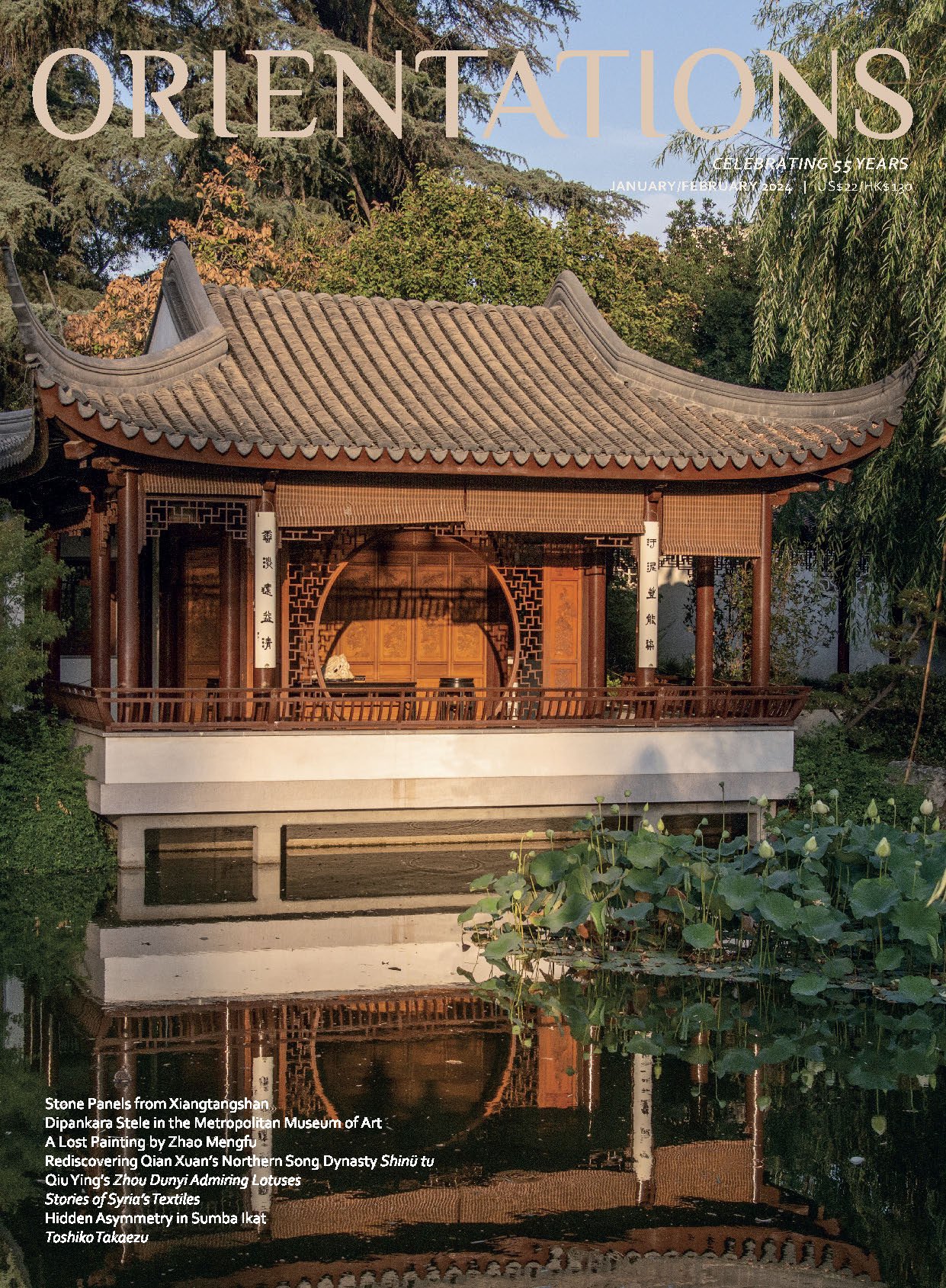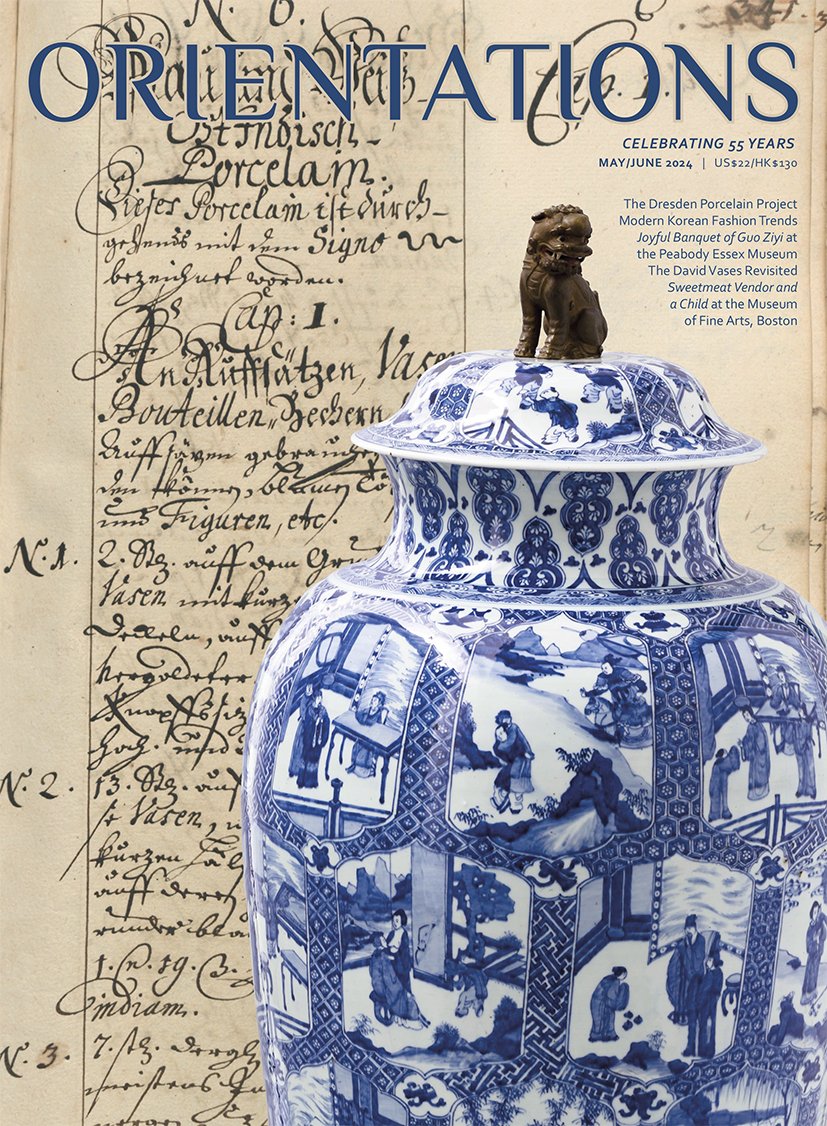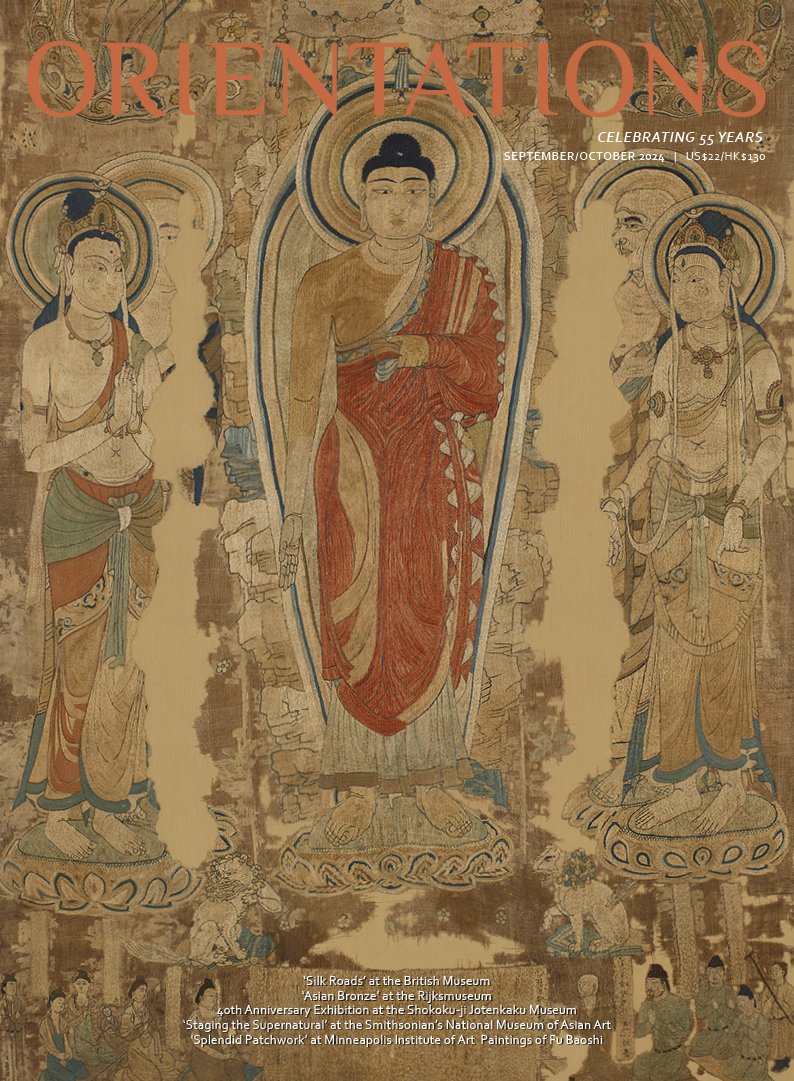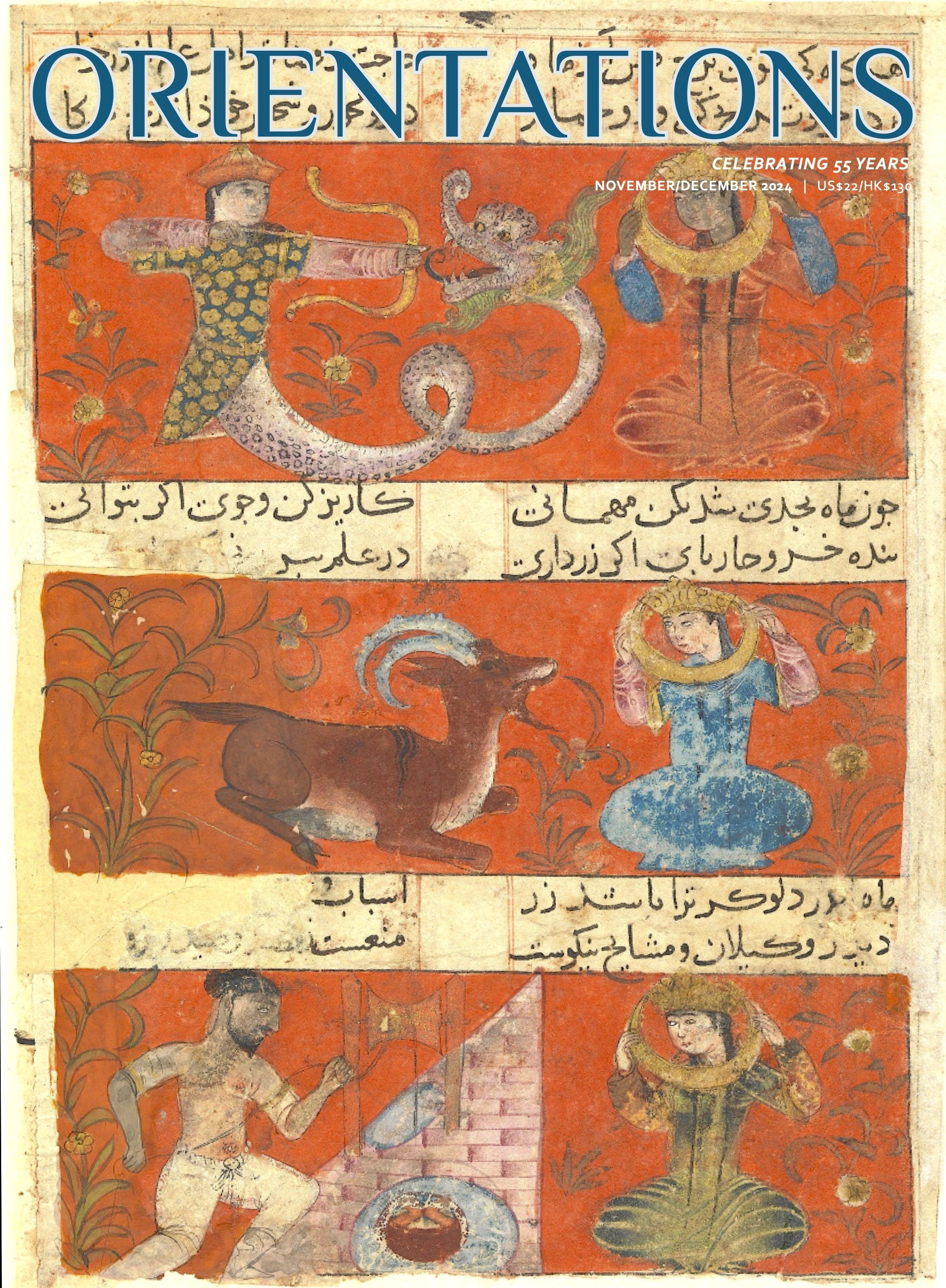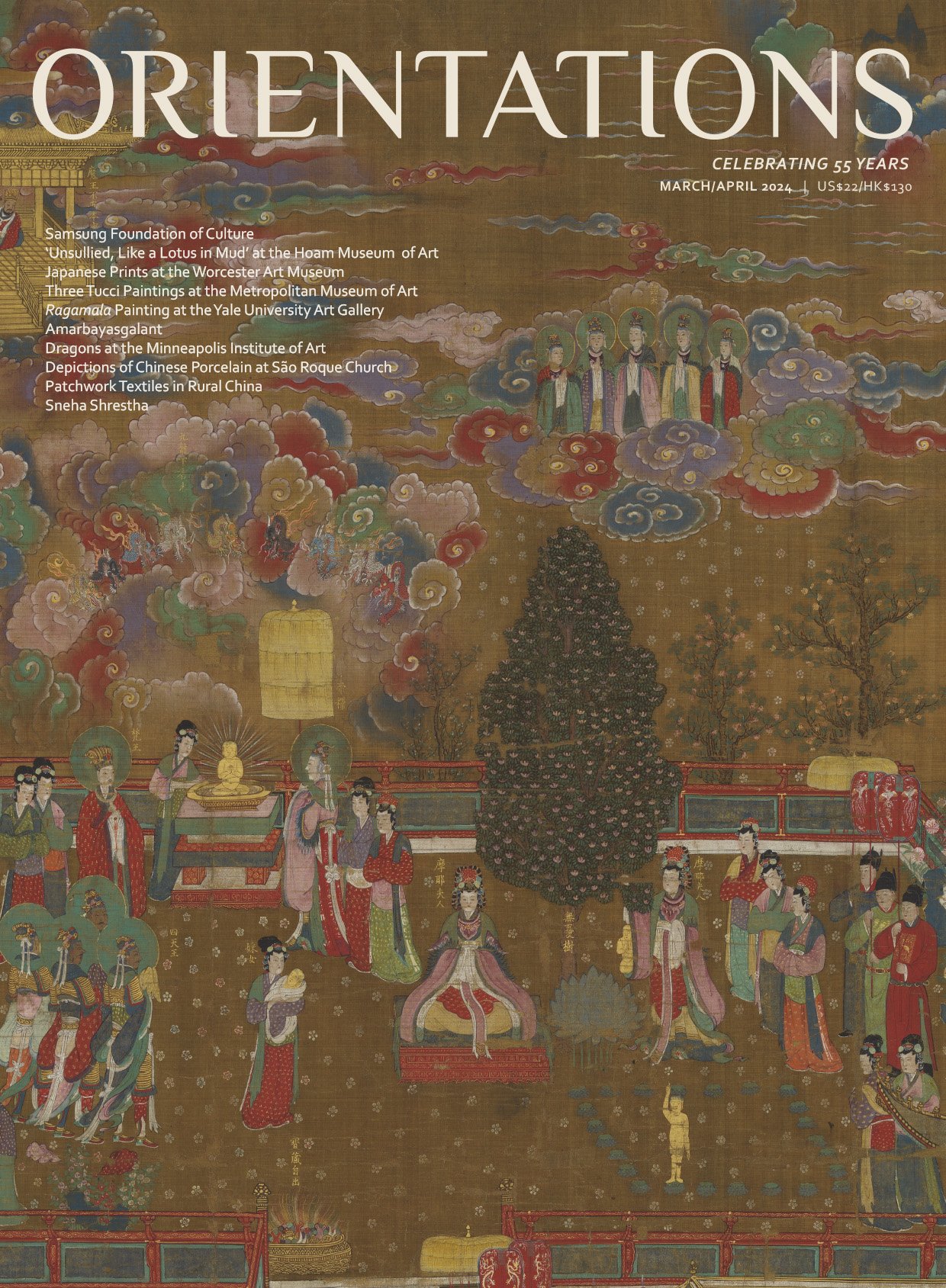JUL/AUG 2024
This issue delves into the rich tapestry of Asian and Islamic art collections across Sweden, Denmark, Norway, and Finland. In collaboration with guest editor Minna Törmä, we uncover how East Asian arts were acquired and influenced these regions, highlighting collections curated by royalty, aristocracy, expatriates, travellers, private individuals, museum professionals, and academics. Törmä’s introduction sets the stage for a wide- ranging exploration of the diversity and lesser-known facets of these Nordic collections, spanning from the 18th century to the present day.
We commemorate the centennial of Chinese archaeology by examining Swedish geologist Johan Gunnar Andersson’s (1874–1960) seminal discovery of Neolithic pottery at Yangshao in 1921. Our focus extends to the National Museum of Denmark’s Asian collection, chronicling its evolution from the Royal Danish Kunstkammer’s Indian Chamber to its enrichment through the efforts of non-royal collectors.
Moving to Oslo’s Museum of Cultural History, we reveal the long-overlooked provenance and propose imperial origin of two exquisite Chinese thrones. We also delve into the scientific analysis Chinese jade objects at Sweden’s Museum of Far Eastern Antiquities. A snuff bottle with a portrait of the Swedish king Gustaf VI Adolf (1882–1973) demonstrates how its inscription and production history reflect intricate networks involving artists, collectors, and historians during the 20th century.
The story of Chinese textile in Scandinavia spans acquisitions from the 13th and 14th centuries by the Church of Sweden to those of the artist Emy Fick (1876–1959). Johan Wilhelm Normann Munthe's (1864–1935) military career was complemented by his role as an art dealer and collector of Chinese art. His collecting practices and contributions to Bergen’s early decorative arts museum are examined. We celebrate C. G. Mannerheim (1867–1951), renowned for his political and military achievements, for his 1906–08 expedition through Central Asia and China disguised as an ethnographer, during which he amassed numerous artefacts. Another noteworthy figure, G. J. Ramstedt (1873–1950), a pioneer of modern Mongolistics, significantly enhanced the National Museum of Finland’s collection during his expedition to Mongolia in 1909.
The David Collection features an extraordinary array of Islamic calligraphy, with works ranging from the 7th to the 19th century. Emphasizing artistic beauty, the collection includes many leaves from Qur’an manuscripts as well as Islamic calligraphic batiks, celebrated more for their aesthetic value than their textual content.
Two articles enrich our understanding of the Yuanmingyuan: the first examines an exhibition at the Hong Kong Palace Museum, revealing the garden’s multifaceted role in varied cultural and ritual events of the Qing dynasty (1644–1911); the second investigates the provenance of looted objects from the Yuanmingyuan.
FEATURES
Minna Törmä. Asian Art and Material Culture in Nordic Countries
Anke Hein. From Sweden to China and Back Again: 'China Gunnar' and the Birth of Chinese Archaeology
Christel Braee, Jesper Kurt-Nielsen, and Martin Petersen. Asian Collections at the National Museum of Denmark: From the Kunstkammer to Comics
Rasmus Bech Olsen. Beyond Words: Calligraphy from the World of Islam
Rose Kerr. Two Spectacular Thrones in the Museum of Cultural History in Oslo
Michel D. Lee, Helena Berg, and Marei Hacke. The Scientific Analysis of Jades from the Museum of Far Eastern Antiquities
Michel D. Lee. Relationships Embodied in a Snuff Bottle
Helen Persson. Chinese Textiles in Scandinavian Collections
Jorunn Haakestad. The Military Man as Art Collector and Art Dealer
Pilvi Vainonen. C.G. Mannherheim's Journey across Asia (1906-1908): Historical Glimpses of Central Asia's Past
Pilvi Vainonen. Cifusi Map of Wutai Shan in the National Museum of Finland Collection
Yang Xu, Rachel Leung, and Li An Tan. Yuanmingyuan: Art and Culture of an Imperial Garden-Palace
John A. Roote. On the Trail of Treasure from China's Lost Summer Palace
Richard A. Pegg. The Politics of Mapping Heaven and Earth in Blue
Louise Lui. Fukusa: Japanese Gift Covers from the Chris Hall Collection
BOOK REVIEWS
Nicholas Purgett. Discovery and Wonder: The Harry F. Bruning Collection at Brigham Young University
REVIEWS
Kexin Ma. 'Transmutations' Wuhan Art Museum (Qintai)
This issue delves into the rich tapestry of Asian and Islamic art collections across Sweden, Denmark, Norway, and Finland. In collaboration with guest editor Minna Törmä, we uncover how East Asian arts were acquired and influenced these regions, highlighting collections curated by royalty, aristocracy, expatriates, travellers, private individuals, museum professionals, and academics. Törmä’s introduction sets the stage for a wide- ranging exploration of the diversity and lesser-known facets of these Nordic collections, spanning from the 18th century to the present day.
We commemorate the centennial of Chinese archaeology by examining Swedish geologist Johan Gunnar Andersson’s (1874–1960) seminal discovery of Neolithic pottery at Yangshao in 1921. Our focus extends to the National Museum of Denmark’s Asian collection, chronicling its evolution from the Royal Danish Kunstkammer’s Indian Chamber to its enrichment through the efforts of non-royal collectors.
Moving to Oslo’s Museum of Cultural History, we reveal the long-overlooked provenance and propose imperial origin of two exquisite Chinese thrones. We also delve into the scientific analysis Chinese jade objects at Sweden’s Museum of Far Eastern Antiquities. A snuff bottle with a portrait of the Swedish king Gustaf VI Adolf (1882–1973) demonstrates how its inscription and production history reflect intricate networks involving artists, collectors, and historians during the 20th century.
The story of Chinese textile in Scandinavia spans acquisitions from the 13th and 14th centuries by the Church of Sweden to those of the artist Emy Fick (1876–1959). Johan Wilhelm Normann Munthe's (1864–1935) military career was complemented by his role as an art dealer and collector of Chinese art. His collecting practices and contributions to Bergen’s early decorative arts museum are examined. We celebrate C. G. Mannerheim (1867–1951), renowned for his political and military achievements, for his 1906–08 expedition through Central Asia and China disguised as an ethnographer, during which he amassed numerous artefacts. Another noteworthy figure, G. J. Ramstedt (1873–1950), a pioneer of modern Mongolistics, significantly enhanced the National Museum of Finland’s collection during his expedition to Mongolia in 1909.
The David Collection features an extraordinary array of Islamic calligraphy, with works ranging from the 7th to the 19th century. Emphasizing artistic beauty, the collection includes many leaves from Qur’an manuscripts as well as Islamic calligraphic batiks, celebrated more for their aesthetic value than their textual content.
Two articles enrich our understanding of the Yuanmingyuan: the first examines an exhibition at the Hong Kong Palace Museum, revealing the garden’s multifaceted role in varied cultural and ritual events of the Qing dynasty (1644–1911); the second investigates the provenance of looted objects from the Yuanmingyuan.
FEATURES
Minna Törmä. Asian Art and Material Culture in Nordic Countries
Anke Hein. From Sweden to China and Back Again: 'China Gunnar' and the Birth of Chinese Archaeology
Christel Braee, Jesper Kurt-Nielsen, and Martin Petersen. Asian Collections at the National Museum of Denmark: From the Kunstkammer to Comics
Rasmus Bech Olsen. Beyond Words: Calligraphy from the World of Islam
Rose Kerr. Two Spectacular Thrones in the Museum of Cultural History in Oslo
Michel D. Lee, Helena Berg, and Marei Hacke. The Scientific Analysis of Jades from the Museum of Far Eastern Antiquities
Michel D. Lee. Relationships Embodied in a Snuff Bottle
Helen Persson. Chinese Textiles in Scandinavian Collections
Jorunn Haakestad. The Military Man as Art Collector and Art Dealer
Pilvi Vainonen. C.G. Mannherheim's Journey across Asia (1906-1908): Historical Glimpses of Central Asia's Past
Pilvi Vainonen. Cifusi Map of Wutai Shan in the National Museum of Finland Collection
Yang Xu, Rachel Leung, and Li An Tan. Yuanmingyuan: Art and Culture of an Imperial Garden-Palace
John A. Roote. On the Trail of Treasure from China's Lost Summer Palace
Richard A. Pegg. The Politics of Mapping Heaven and Earth in Blue
Louise Lui. Fukusa: Japanese Gift Covers from the Chris Hall Collection
BOOK REVIEWS
Nicholas Purgett. Discovery and Wonder: The Harry F. Bruning Collection at Brigham Young University
REVIEWS
Kexin Ma. 'Transmutations' Wuhan Art Museum (Qintai)
This issue delves into the rich tapestry of Asian and Islamic art collections across Sweden, Denmark, Norway, and Finland. In collaboration with guest editor Minna Törmä, we uncover how East Asian arts were acquired and influenced these regions, highlighting collections curated by royalty, aristocracy, expatriates, travellers, private individuals, museum professionals, and academics. Törmä’s introduction sets the stage for a wide- ranging exploration of the diversity and lesser-known facets of these Nordic collections, spanning from the 18th century to the present day.
We commemorate the centennial of Chinese archaeology by examining Swedish geologist Johan Gunnar Andersson’s (1874–1960) seminal discovery of Neolithic pottery at Yangshao in 1921. Our focus extends to the National Museum of Denmark’s Asian collection, chronicling its evolution from the Royal Danish Kunstkammer’s Indian Chamber to its enrichment through the efforts of non-royal collectors.
Moving to Oslo’s Museum of Cultural History, we reveal the long-overlooked provenance and propose imperial origin of two exquisite Chinese thrones. We also delve into the scientific analysis Chinese jade objects at Sweden’s Museum of Far Eastern Antiquities. A snuff bottle with a portrait of the Swedish king Gustaf VI Adolf (1882–1973) demonstrates how its inscription and production history reflect intricate networks involving artists, collectors, and historians during the 20th century.
The story of Chinese textile in Scandinavia spans acquisitions from the 13th and 14th centuries by the Church of Sweden to those of the artist Emy Fick (1876–1959). Johan Wilhelm Normann Munthe's (1864–1935) military career was complemented by his role as an art dealer and collector of Chinese art. His collecting practices and contributions to Bergen’s early decorative arts museum are examined. We celebrate C. G. Mannerheim (1867–1951), renowned for his political and military achievements, for his 1906–08 expedition through Central Asia and China disguised as an ethnographer, during which he amassed numerous artefacts. Another noteworthy figure, G. J. Ramstedt (1873–1950), a pioneer of modern Mongolistics, significantly enhanced the National Museum of Finland’s collection during his expedition to Mongolia in 1909.
The David Collection features an extraordinary array of Islamic calligraphy, with works ranging from the 7th to the 19th century. Emphasizing artistic beauty, the collection includes many leaves from Qur’an manuscripts as well as Islamic calligraphic batiks, celebrated more for their aesthetic value than their textual content.
Two articles enrich our understanding of the Yuanmingyuan: the first examines an exhibition at the Hong Kong Palace Museum, revealing the garden’s multifaceted role in varied cultural and ritual events of the Qing dynasty (1644–1911); the second investigates the provenance of looted objects from the Yuanmingyuan.
FEATURES
Minna Törmä. Asian Art and Material Culture in Nordic Countries
Anke Hein. From Sweden to China and Back Again: 'China Gunnar' and the Birth of Chinese Archaeology
Christel Braee, Jesper Kurt-Nielsen, and Martin Petersen. Asian Collections at the National Museum of Denmark: From the Kunstkammer to Comics
Rasmus Bech Olsen. Beyond Words: Calligraphy from the World of Islam
Rose Kerr. Two Spectacular Thrones in the Museum of Cultural History in Oslo
Michel D. Lee, Helena Berg, and Marei Hacke. The Scientific Analysis of Jades from the Museum of Far Eastern Antiquities
Michel D. Lee. Relationships Embodied in a Snuff Bottle
Helen Persson. Chinese Textiles in Scandinavian Collections
Jorunn Haakestad. The Military Man as Art Collector and Art Dealer
Pilvi Vainonen. C.G. Mannherheim's Journey across Asia (1906-1908): Historical Glimpses of Central Asia's Past
Pilvi Vainonen. Cifusi Map of Wutai Shan in the National Museum of Finland Collection
Yang Xu, Rachel Leung, and Li An Tan. Yuanmingyuan: Art and Culture of an Imperial Garden-Palace
John A. Roote. On the Trail of Treasure from China's Lost Summer Palace
Richard A. Pegg. The Politics of Mapping Heaven and Earth in Blue
Louise Lui. Fukusa: Japanese Gift Covers from the Chris Hall Collection
BOOK REVIEWS
Nicholas Purgett. Discovery and Wonder: The Harry F. Bruning Collection at Brigham Young University
REVIEWS
Kexin Ma. 'Transmutations' Wuhan Art Museum (Qintai)


